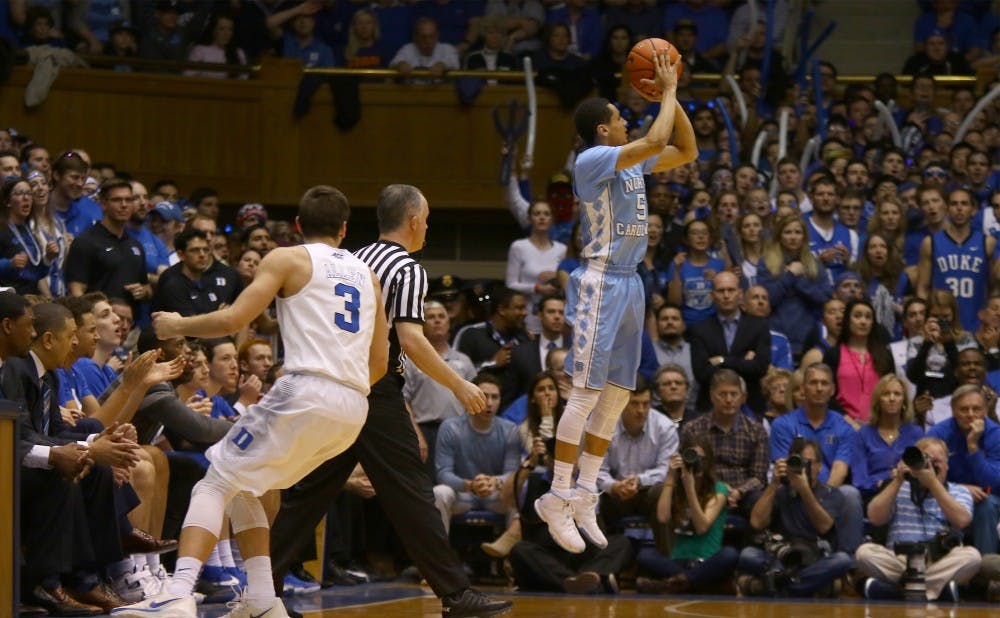With 4:42 remaining in the national championship game April 4, it was all but over.
Villanova had pulled ahead by 10 points and North Carolina seemed to be spiraling out of control, unable to buy a bucket or catch a break. But a 7-0 run in less than a minute brought the Tar Heels back, leaving fans on the edge of their seats for the final stretch of the college basketball season.
As the clock ticked down, it seemed like the most poetic ending for one of the sport’s most respected seniors. The roller-coaster ride that was Marcus Paige’s career in Chapel Hill was nearly smoothed by the most improbable shot from the right wing. The guard slid past his defender and with a second-guessed, double-clutch shot, sent NRG Stadium into a state of pandemonium—the game was tied at 74 with 4.7 seconds left and North Carolina was poised to roll into overtime atop a wave of momentum for its sixth national title.
But everyone learned a valuable lesson in the game’s remaining moments—don’t assume anything and never sleep on the Wildcats.
It wasn’t quite as miraculous as Christian Laettner’s shot to beat Kentucky in 1992, but Villanova forward Kris Jenkins took a trailing pass from teammate Ryan Arcidiacono at the right wing and pulled up from downtown. As the ball floated through the air, the backboard lit up and the buzzer sounded. Moments later, the net was left shaking in the wake of the ball’s path.
The Wildcats had won 77-74, with Jenkins stabbing a dagger through the heart of Tar Heel nation.
In that span of 4.7 seconds between 3-pointers, sports reiterated just how exhilarating and cruel they can be at the same time—the sequence truly embodied the joy of victory and the agony of defeat.
But it also reminded me of something else about sports—nothing is ever improbable.
When Bill Simmons wrote “The Book of Basketball” in 2009 he made one of his more uncontroversial claims.
“I can’t imagine anyone finishing [an NBA] season with fewer than 10 losses. It’s too improbable,” he wrote.
In a tweet Sunday night, even Simmons had to admit that he had made a miscalculation. That miscalculation was the Golden State Warriors.
With a 92-86 victory against the San Antonio Spurs on the road—the first win in San Antonio for the Warriors since 1997, when Tim Duncan still played for Wake Forest and Stephen Curry was just eight years old—Golden State tied the 1995-96 Chicago Bulls record of 72 wins in a season and snapped the Spurs’ 2015-16 undefeated home record. Now the Warriors have one game left Wednesday against the Memphis Grizzlies, a team that has been no match for Golden State this season. The Warriors toppled the Grizzlies on the road Saturday night and boast a 3-0 record against them this year, including a 50-point drubbing Nov. 2. Without Mike Conley or Marc Gasol in the lineup due to injuries, it seems that the 73rd win is very much within reach.
Did I mention the game is in Oracle Arena? So much for improbable, right Bill Simmons?
And don’t even get me started on this year’s Masters. For most of the weekend, it seemed like Jordan Spieth had the green jacket gifted to him for the second straight year and no one could stop him from leaving Augusta as the first back-to-back champion since Tiger Woods in 2001-02. After four consecutive birdies to close the front nine, Spieth made the turn at seven-under-par, leaving few doubts that he would make it happen once again with a five-shot lead.
But after back-to-back bogeys, two dips in Rae’s Creek and a quadruple bogey on No. 12, Spieth’s Masters hopes were dashed. Although no one would question how impressive a title and two runner-up finishes in a span of three years at the world’s most prestigious golf event, the epic collapse that gave Englishman Danny Willett his first green jacket had shades of Greg Norman’s 1996 Masters collapse written all over it. With his final-round 67, Willett became the first European player to win the Masters since 1999.
It was improbable. It was shocking. No one saw it coming.
But maybe this is why we should all respect the games that we love. As someone stuck in a daily routine, I appreciate the nuance and unpredictability of sports. Did it ruin my bracket when 15th-seeded Middle Tennessee State toppled second-seeded Michigan State? Of course, but the sheer shock of the upsets and Cinderella runs keep me coming back for more year after year. As Hall of Fame Kentucky head coach Adolph Rupp once said, “That’s why we play the game.”
Ask our friends from across the pond. Did anyone suspect that Leicester City would seize the English Premier League title for the first time in history? Not with 5,000-1 odds they didn’t. But during the weekend, the Foxes secured a place in the UEFA Champions League next season and maintained their seven-point lead atop the table with a little more than a month remaining.
And just for context, those 5,000-1 odds are the same as the odds that Elvis is still alive—that is why we play the game.
So for as much talk as there is about knowing what is next or something being a sure victory, do not be so quick to judge. Ask North Carolina, Spieth or the Spartans—they won’t think anything is a sure bet. That is why we play the game. That is why we come back day in and day out, week after week. Sports are shocking, exhilarating and often improbable, but that’s what makes them great. If it were not for sports, what else would bring us such delight and agony all in one whirlwind of emotions?

